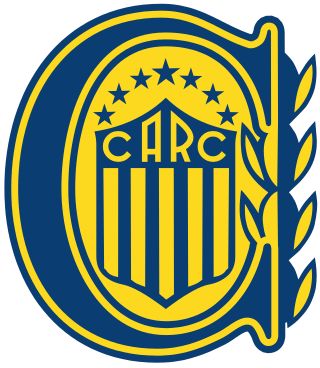
Club Atlético Newell's Old Boys is an Argentine sports club based in Rosario, Santa Fe. The club was founded on 3 November 1903, and is named after Isaac Newell of the English county of Kent, one of the pioneers of Argentine football.

Club Atlético Rosario Central, more commonly referred to as Rosario Central, is a sports club based in Rosario, Argentina, that plays in the Argentine Primera División. The club was officially founded on December 24, 1889, by a group of railway workers, taking its name from the British-owned Central Argentine Railway company. One of the oldest Argentine and Latin American teams, it is considered a pioneer in its hometown and the only one of current Santa Fe province teams to have won an international title organised by CONMEBOL, the Copa Conmebol, won by the club in 1995.

Club Atlético All Boys is an Argentine sports club based in Floresta, Buenos Aires. The institution is mostly known by its football team, which currently plays in the Primera B Nacional, the second division of the Argentine football league system.

Santiago "Cucurucho" Santamaría was an Argentine professional footballer who played primarily as a winger.

Alfredo Domingo Obberti was an Argentine footballer who played as a striker for a number of clubs in Argentina and Grêmio in Brazil.

The Rosario derby is the oldest and one of the most fiercely contested football rivalries in Argentine football.
The 1971 Primera División season was the 80th season of top-flight football in Argentina. The Campeonato Metropolitano championship was modified, returning to a double round-robin format, and four relegations. Nevertheless, the AFA interventor, Raúl D'Onofrio, reduced the number of relegated teams to two.
The 2009–10 Primera División season was the 119th season of top-flight professional football in Argentina. A total of 20 teams competed in the season, which started on 21 August 2009 and ended on 23 May 2010.
The 2010–11 Primera División season was the 120th season of top-flight professional football in Argentina. A total of 20 teams competed in two championships —the Apertura and Clausura— over the course of the season, which started on August 6, 2010 and ended on June 30, 2011, one day prior to the start of the 2011 Copa América, held in Argentina.
The 2011–12 Argentine Primera B Nacional was the 26th season of second division professional of football in Argentina. A total of 20 teams competed; the champion and runner-up were promoted to Argentine Primera División.
The 2012–13 Argentine Primera B Nacional was the 27th season of second division professional of football in Argentina. A total of 20 teams competed; the champion, runner-up and third-placed team were promoted to Argentine Primera División.
The 2013–14 Primera División season was the 123rd season of top-flight professional football in Argentina. It started on August 2, 2013 and ended on May 24, 2014. Twenty teams competed in the league, seventeen returning from the 2012–13 season and three promoted from the Primera B Nacional Championship. For first time Independiente did not compete in the Primera División championship.
The 2009–10 Argentine Primera B Nacional was the 24th season of second division professional of football in Argentina. A total of 20 teams competed; the champion and runner-up were promoted to Argentine Primera División.
The 2008–09 Argentine Primera B Nacional was the 23rd season of second division professional of football in Argentina. A total of 20 teams competed; the champion and runner-up were promoted to Argentine Primera División.
The 2007–08 Argentine Primera B Nacional was the 22nd season of second division professional football in Argentina. A total of 20 teams competed; the champion and runner-up were promoted to Argentine Primera División.
Alejandro Fabián Gagliardi is an Argentine professional footballer who currently plays for Santamarina.
Rodrigo Javier Salinas is an Argentine professional footballer who plays as a forward for Primera División Peruana side Atlético Grau.
Gastón Ezequiel Guruceaga Bracamonte is an Argentine professional footballer who plays as a right-back for Huércal-Overa.
Juan Ignacio Vieyra is an Argentine professional footballer who plays as a central midfielder for Marathón in Honduras.

Roberto Artemio Gramajo was an Argentinian football player. Nicknamed "Chango", he played as a forward primarily during the 1970s; he was a part of football clubs such as Rosario Central, Panathinaikos and Huracán. He also briefly played for Argentina to be listed in the Brazil Independence Cup roster, despite not traveling with the team.







